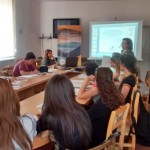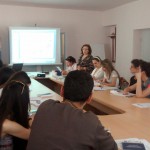Overview and Goals
The American University of Armenia’s Center for Responsible Mining proposes to organize a series of high-level multi-stakeholder discussions on key mining issues in Armenia. The initial discussion sessions are proposed from October 2014 to June 2015.
The immediate goals of this dialogue series are:
– To start a constructive dialogue with the involvement of national and local governments, civil society and mining industry companies to identify and formulate all stakeholder concerns regarding specific discussion topics related to improving the social, economic, and environmental performance of the mining sector;
– To identify possible contributions from each stakeholder resulting in improved social, economic, and environmental performance of the mining sector.
Its long-term goal is to act as a trust- and confidence-building exercise that leads to the development of an in-country institutional capacity for holding peaceful, effective dialogue on mining with all stakeholders. The stakeholders will include high-level government representatives, interested members of the international community, civil society activists, industry leaders, and, when possible, members of affected communities.
Discussion Topics
Based on a review of half a decade of debate on mining in Armenia, the AUA Center for Responsible Mining proposes the following topics for the dialogue sessions:
- Extractive Industries Transparency Initiative (EITI): Why join?
- Monitoring and compliance – Making it work
- Legacy sites and their management – What to do?
- Legislative Gaps – Key issues and paths forward
- Mining sector policy – Do we have it right?
- Taxation of the mining sector in Armenia – Benchmarking
- International investments in the mining sector
- Role of NGOs in responsible mining
These topics may be modified or other topics may emerge over time.
Format and Rules of Engagement
AUA Center for Responsible Mining proposes that each session focus on one of the topics above. The stakeholders, however, may decide on an alternate arrangement. For instance, at the conclusion of a discussion session, the group may decide to meet again on the same topic as a follow up, or to create a sub-group for follow up actions to be reported back to the larger group. Such options will be discussed in due course.
Each session is expected to last up to 2 hours. Participants are expected to come prepared for the discussion by reviewing the literature and documents sent beforehand. The structured discussion will identify common interests, mutually agreeable standards, issues that require further examination, and specific next steps. AUA will prepare background documents for distribution one week (5 working days) before any session.
The series will take place at the American University of Armenia, which will act as a neutral ground for the sides to meet and engage in dialogue. The discussions will be held in a structured, non-confrontational format. It is proposed that no media be present.
The director of the AUA Center for Responsible Mining will moderate the sessions. Alternatively he may select mediation experts for this task. In conducting the sessions, the moderator will strictly adhere to rules of engagement agreed upon in advance by all participants.
The working language of the dialogue series will be Armenian.
Seminar on Extractive Industries Transparency Initiative (EITI) and Civil Society Organizations
Access the seminar video here and seminar presentations please click here for English version and here for Armenian.
Training on Environmental Risks and Health Consequences of Mining in Armenia
YEREVAN, Armenia – On April 13, 2015, the American University of Armenia Center for Responsible Mining (AUA CRM) in partnership with Caucuses Environmental NGO Network (CENN) and Aarhus Center in Alaverdi conducted a training on environmental risks and health consequences of mining in Armenia.
The training was held in the City of Alaverdi, Lori region and was attended by 45 individuals from different communities in Lori region including Alaverdi, Akhtala, Teghut, Tchotchkan, and Mets Ayrum. There were representatives from local governmental bodies, city councils, health-care organizations, NGOs, media and youth groups.
The aim of the training was to raise awareness among local community members about reducing exposure to heavy metals such as arsenic and lead that are accumulated in the environment through mining and smelting related activities.
Ruzanna Grigoryan, MD, MPH, who worked at the American University of Armenia School of Public Health (AUA SPH) for many years and coordinated projects of the AUA SPH in mining and smelting communities in Armenia, conducted the training. She presented the AUA SPH research on heavy metals in Alaverdi and informed the participants on prevention using the materials developed by the AUA SPH for the pilot project conducted in Akhtala with support from Blacksmith Institute for a Pure Earth.
During the training, Dr. Grigoryan focused on the safety measures and techniques that individuals can utilize in their everyday life to reduce the harmful health impacts of mining pollution.The audience shared their concern regarding the current state of pollution in Alaverdi. They also expressed an interest in learning more about research findings related to other communities in the Lori region. Dr. Grigoryan informed the participants of publicly available data sources, which include some of the affected communities of the Lori region. Many attendees expressed interest in similar trainings in the future.
The training was implemented within CENN’s regional project Promoting Environmental and Social Accountability in the Mining Sector in the Caucasus. The goal of the project is to reduce poverty, enhance environmental and social security and foster sustainable rural development. The project is being implemented with the financial support of the German fund Bread for the World.
The American University of Armenia Center for Responsible Mining (AUA CRM) promotes the creation as well as transfer and adoption in Armenia of best practices in socially, environmentally, and economically responsible mining. AUA CRM works with companies, civil society, and the public sector to achieve this goal.
Founded in 1991, the American University of Armenia (AUA) is a private, independent university located in Yerevan, Armenia and affiliated with the University of California. AUA provides a global education in Armenia and the region, offering high-quality, graduate and undergraduate studies, encouraging civic engagement, and promoting public service and democratic values.
 |
 |
 |
Public Participation in Environmental Legislation Decision-Making Process: Possibilities, Obstacles, and Practice
YEREVAN, Armenia – On June 9, 2015, the American University of Armenia (AUA) Center for Responsible Mining (CRM), in partnership with Caucuses Environmental NGO Network (CENN) and Aarhus Center in the city of Alaverdi (Lori region), conducted a training on promoting public participation in the legislative process for environmental laws.
The training was developed and delivered by the Environmental Law Resource Center at Yerevan State University, headed by Professor Aida Iskoyan, an expert in national and international environmental law. The aim of the training was to raise awareness about the importance of public participation in decision-making processes related to environmental laws and to provide the participants with the information and tools required to effectively participate in the legislative process. The trainers stressed the importance of building capacity in local communities, equipping them with the ability to address environmental legislation constructively by engaging with state institutions at the local and national level.
- The training included an introduction to the basic principles and mechanisms of public participation in the legislative process. The participants were provided with the relevant international conventions ratified by the Republic of Armenia that have provisions ensuring the public’s involvement in the legislative process related to environmental laws. Finally, the trainers presented practical tools the attendees could utilize to facilitate their participation in the legislative process, such as getting access to relevant environmental information and draft legislation through established state procedures.
- Participants included 17 members of local youth groups from student councils, youth initiatives, and members of local NGOs involved in environmental protection and the promotion of civil society. Media outlets were also present, such as “Hetq” online news journal and “Ankyun+3,” a local TV station that interviewed one of the trainers for a news story that is to air on their channel.
- The training was implemented within CENN’s regional project, “Promoting Environmental and Social Accountability in the Mining Sector in the Caucasus.” The goal of the project is to reduce poverty, enhance environmental and social security, and foster sustainable rural development. The project is being implemented with the financial support of Bread for the World, a German fund.
 |
 |
